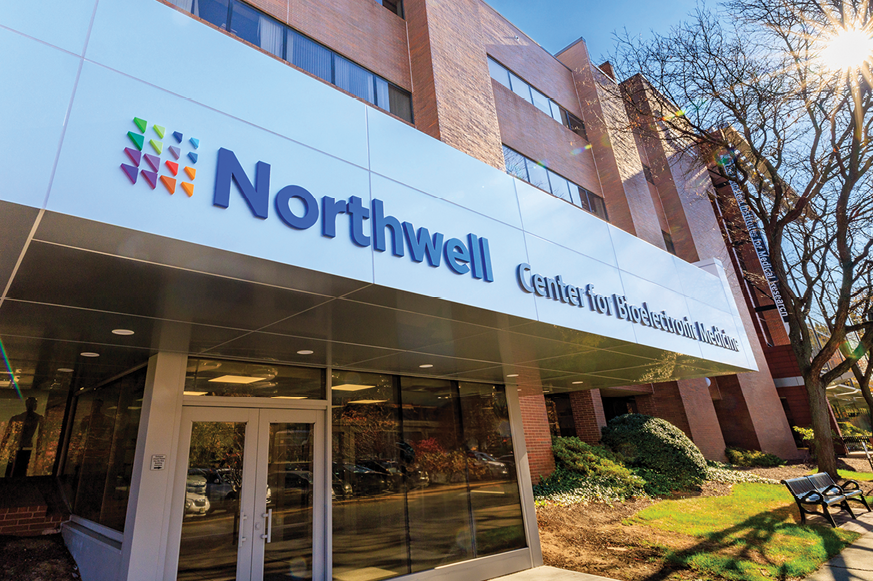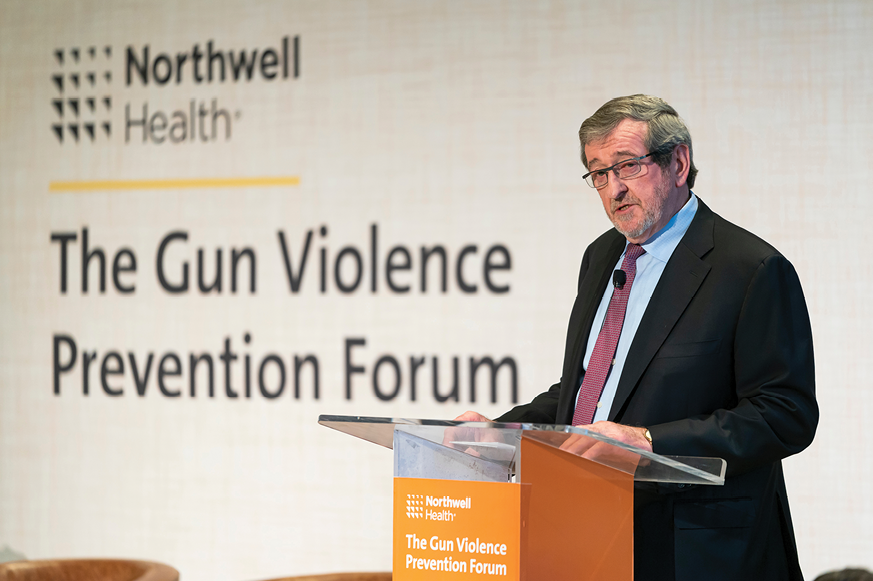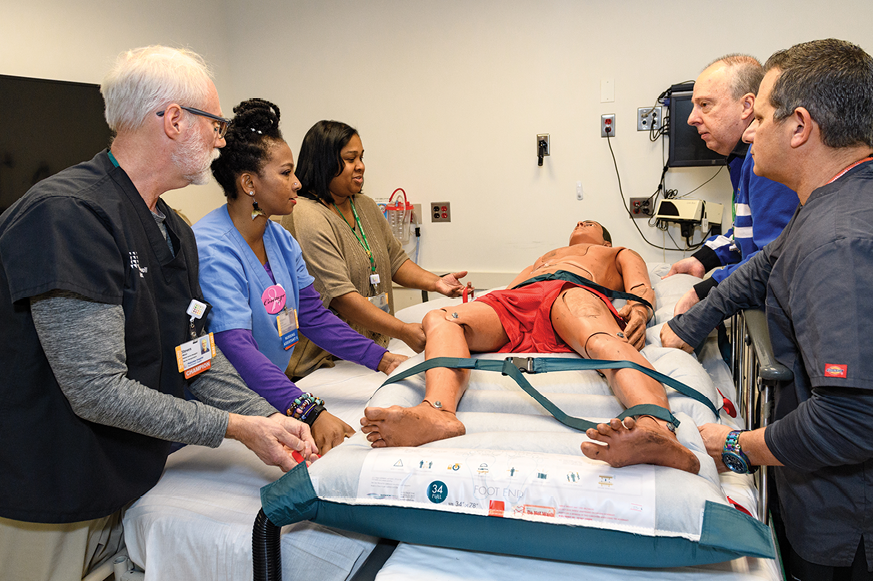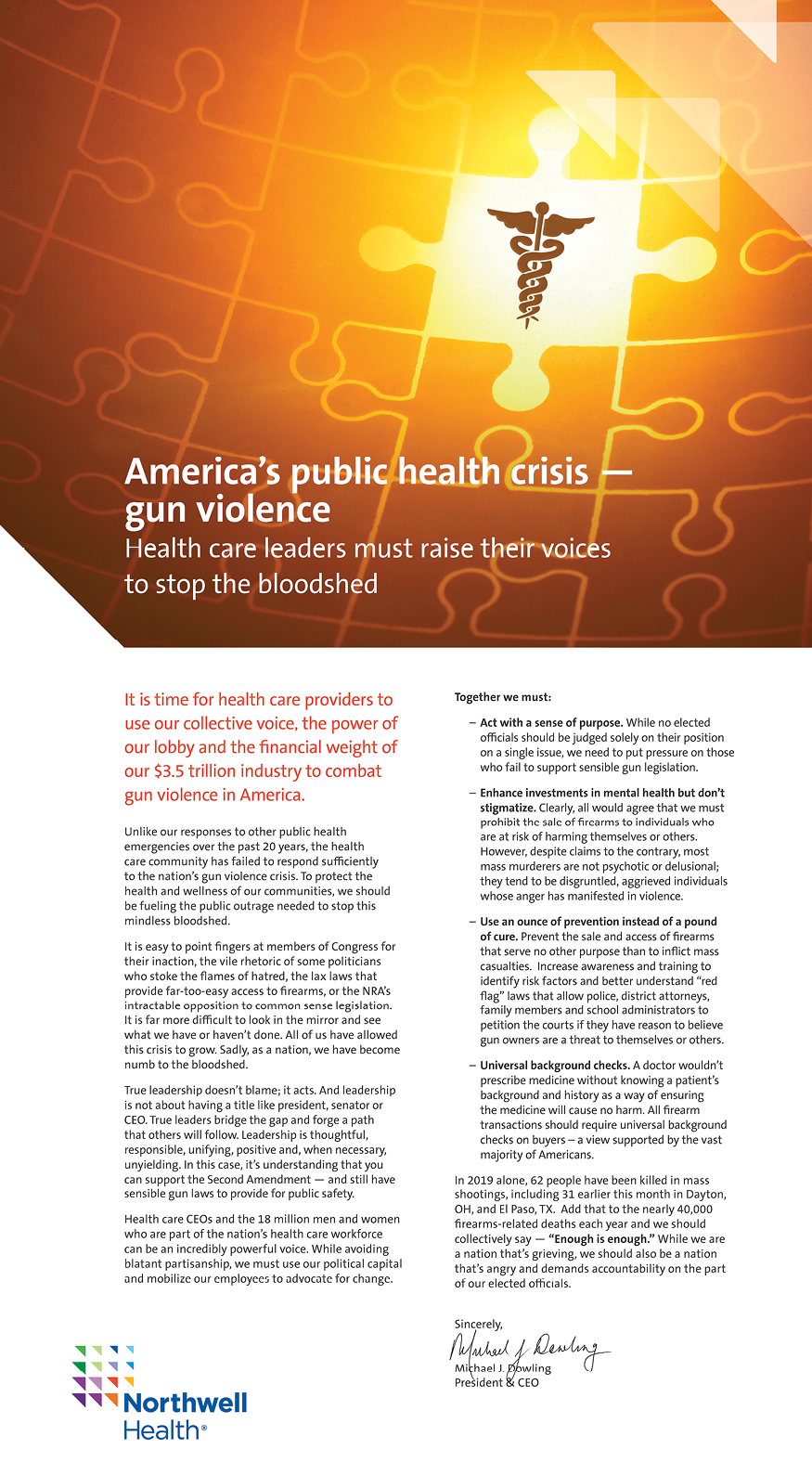- Home
- Media Kit
- MediaJet
- Current Issue
- Past Issues
- Ad Specs-Submission
- Reprints (PDF)
- Photo Specifications (PDF)
- Contact Us
- PRIVACY POLICY
- TERMS OF USE
![]()
ONLINE
![]()
ONLINE

A Lasting Legacy
Editors’ Note
Michael Dowling is CEO Emeritus of Northwell Health. He is one of healthcare’s most influential voices, taking a stand on societal issues such as gun violence and immigration that many health system CEOs shy away from. His leadership has been invaluable to Northwell’s consistent expansion and prominence. In March 2020, he successfully navigated the health system through the first COVID-19 epicenter in the U.S., detailing Northwell’s experiences in a book titled, Leading Through a Pandemic: The Inside Story of Humanity, Innovation, and Lessons Learned During the COVID-19 Crisis. Overall, Northwell treated more than 300,000 COVID patients during the first two years of the pandemic – more than any other U.S. health system. Prior to becoming CEO in 2002 and joining Northwell in 1995, Dowling served in New York State government for 12 years, including seven years as State Director of Health, Education, and Human Services and Deputy Secretary to former Governor Mario Cuomo. He was also Commissioner of the State Department of Social Services. Before entering public service, he was a Professor of Social Policy and Assistant Dean at the Fordham University Graduate School of Social Services and Director of the university’s Westchester County campus. Dowling has been honored with many awards and recognitions over the years, including the Ellis Island Medal of Honor, the Presidential Distinguished Service Award for the Irish Abroad, the Alfred E. Smith Award from the American Society for Public Administration, the National Human Relations Award from the American Jewish Committee, and the Foreign Policy Association Medal Award. In 2017, he was selected to serve as the Grand Marshal of New York’s St. Patrick’s Day Parade. In 2022, he was named the most influential leader in healthcare by Modern Healthcare, ranking number 1 in its annual list of the “100 Most Powerful People in Healthcare,” a list on which he has been featured for 18 consecutive years. Dowling is a member of the Institute of Medicine of the National Academies of Sciences, the Foreign Policy Association, and the North American Board of the Smurfit School of Business at University College, Dublin, Ireland. He is past chair and a current board member of the National Center for Healthcare Leadership (NCHL), the Greater New York Hospital Association, the Healthcare Association of New York State, the Healthcare Institute, and the Institute for Healthcare Improvement (IHI). Dowling was an instructor at the Center for Continuing Professional Education at the Harvard School of Public Health. He earned his undergraduate degree from University College Cork (UCC), Ireland, and his master’s degree from Fordham University. He also has honorary doctorates from the prestigious Queen’s University Belfast, University College Dublin, Hofstra University, Dowling College, and Fordham University.
Institution Brief
Northwell Health (northwell.edu) is a clinical, academic, and research enterprise with a workforce of about 90,000 and annual revenue of nearly $20 billion. Northwell is the largest healthcare provider and private employer in New York State, caring for more than two million people annually through a vast network of 21 hospitals, more than 950 outpatient facilities, including 75 urgent care centers, as well as home care, rehabilitation, and end-of-life programs. Northwell also pursues pioneering research at the Feinstein Institutes for Medical Research and a visionary approach to medical education highlighted by the Zucker School of Medicine, the Hofstra Northwell School of Nursing and Physician Assistant Studies, and one of the nation’s largest medical residency and fellowship programs.

After decades of pioneering bioelectronic medicine research,
Northwell recently opened its clinical Center for Bioelectronic
Medicine. Patients interested in participating in bioelectronic
medicine clinical trials, including studies evaluating vagus
nerve stimulation, can do so through the new Center. The
first Center is located at 350 Community Drive in
Manhasset, New York.
How do you define Northwell Health’s mission?
Our mission, at its core, is to be a comprehensive and trusted resource and partner with the community to promote health and wellness and provide equitable access to care for all irrespective of circumstance. The mission, in the case of Northwell, is broad and multifaceted. We want to be the employer of choice – the best place to work that provides opportunities for growth and development. We, as one of the largest academic teaching facilities, educate the future workforce – physicians, nurses and others, many of whom eventually migrate to other parts of the country to provide care. We invest in science to promote discoveries that can cure diseases – thereby providing better care to future generations. We tackle societal issues, such as gun violence and climate change, that negatively affect health. And we aim to be a positive and entrepreneurial influence by constantly promoting those values that build the idea of community – values such as decency, respect, honesty, truth, kindness, tolerance, and trust. These values are more important today than ever given the toxicity of our current politics and political discourse. What we daily observe is not what we should be. To change its course requires more advocacy of these values by more healthcare and business leaders. It’s time for more courage.
You are transitioning to the role of CEO Emeritus. How will you focus your efforts in this new role?
I plan to stay very active. My first obligation is to fully support and promote the success of my successor, Dr. John D’Angelo. He has worked with me for about 20 years. He, thereby, has a firm knowledge of Northwell’s history, its evolution, and most importantly, its culture. We are both passionately committed to the ongoing success of the organization and view the future as full of wonderful opportunities.
There are a number of areas that I plan to specifically focus on. One is leadership development, education and training. One of the first things I did when I became CEO 23 years ago was to create the Center for Learning and Innovation (CLI). I plan to promote its evolution and expansion. I also want to focus on the issue of mental health, an area of growing expansion and concern, especially among young people. I will, obviously, stay very involved in the area of gun violence prevention and safety as well as other societal issues that bear negatively on the promotion of good health – such as the current assault on vaccines and on research. There are no shortage of issues. I look forward to a seamless transition with no disruption to the ongoing operations of Northwell. I am stepping down as CEO, but I am not stepping away.
“I plan to stay very active. My first obligation is to fully support and promote the success of my successor, Dr. John D’Angelo. He has worked with me for about 20 years. He, thereby, has a firm knowledge of Northwell’s history, its evolution, and most importantly, its culture.”
During your more than 23 years leading Northwell Health, you led the transition of Northwell from a network of Long Island-based hospitals into one of the nation’s ten largest health systems. Will you discuss this transformation journey?
This is a long story and would require much more space than is allotted here. I will briefly summarize. The entity that began the process was Northshore Hospital under the leadership of Jack Gallagher. There were no health systems in New York back then in the early 1990s – just a collection of independent facilities and most care was delivered in hospitals. The idea and belief was that if hospitals came together, worked together, they could better serve the community than by being separate and independent. I arrived as the COO at Northshore Hospital in the early 90s. The first merger was Glen Cove Hospital and eight other mergers occurred in the next few years. It was a hectic time, in part because we were doing what had not previously occurred in New York. Other health systems did exist in other parts of the country, such as Kaiser Permanente in California and Intermountain in Utah.
In the early 90s, with about nine hospitals, we were the Northshore Health System. A huge step occurred in 1997 when Long Island Jewish Hospital (LIJ) joined. This made big news because we were sued by the U.S. Justice Department to prevent the merger. We prevailed and when LIJ joined, we became the Northshore/LIJ Health System. The goal, from the very beginning, was not to amass a collection of independent entities, but to create synergy and integration based on access and quality of care to create a real integrated care delivery system.
Subsequent to the LIJ merger, we continued to expand, change, and evolve. Both Northshore Hospital and LIJ were substantial academic teaching facilities and that investment accelerated. We are now one of the largest academic teaching institutions in the U.S. with about 2,400 residents and fellows, have our own medical school (Zucker School of Medicine in partnership with Hofstra) and our own graduate and undergraduate nursing schools. We also expanded our investment in research – it is now the Feinstein Institutes for Medical Research, a leading national player and the founder of Bioelectronic Medicine – a new and exciting field of discovery and care.
Over the years, we became one of the leaders in expanding the field of outpatient and ambulatory care – providing essential care outside of the hospitals. Today we have 1,050 such locations. We similarly expanded the provision of care in the home as well as our core commitment to expand services in the community. We have a broad portfolio of services and programs in underserved areas across our catchment area.
Our most recent merger (our 20th overall) was with Nuvance in New York and Connecticut – a seven hospital system with over 14,000 employees.
It’s been an exhilarating journey and a successful one. We are now the largest provider of care in New York and the largest private employer (104,000 employees). What’s important, however, is the creation of a culture that is dedicated to serving the public, taking care of all irrespective of circumstance, promoting the well-being of staff and being a trusted community asset.

In its seventh year, The Gun Violence Prevention Forum
will welcome 150+ dedicated leaders in-person in New York
City, and thousands more virtually, on March 5, 2026.
This annual convening of changemakers is hosted by
Northwell Health, with the mission to mobilize the collective
efforts of leading executives, clinicians, researchers, and
policymakers around gun violence as a public health emergency.
How critical were the investments you made in research to the growth of the Feinstein Institutes for Medical Research?
Research – the pursuit of knowledge to prevent and cure diseases – is the key to future health and well-being. The U.S. has been a leader and in the forefront of this effort, investing the necessary resources, building the infrastructure, and facilitating diverse and international partnerships. Unfortunately, it is currently under assault by the firings of a multitude of scientists, the reduction and elimination of resources (grants, etc.), and the promotion of distrust in science – note the circumstance with regard to vaccines and vaccinations. These efforts will derail promising progress and have a long-term detrimental effect. It is currently having a negative impact on most research centers.
The Feinstein Institutes for Medical Research is the primary research arm of Northwell Health. It receives major grants from the NIH (now at risk) and from investments by Northwell. It is an important system priority – and will continue to be so. The discoveries that have emanated from Feinstein have improved health for multitudes of patients. The successes are too numerous to recount here, but I will mention one – bioelectronic medicine – a revolutionary new treatment where a tiny device is implanted on the vagus nerve to dramatically calm down long-term inflammation. Imagine what this advance may mean for so many diseases – such as Rheumatoid Arthritis, Crohn’s Diseases, and many more – all the results of over 20 years of research. To learn more about this, read Dr. Kevin Tracey’s recent book, The Great Nerve.
Will you highlight your commitment to innovative medical education through the Zucker School of Medicine, the Hofstra-Northwell School of Nursing, and Northwell’s Center for Learning and Innovation, and how these schools are cultivating the next generation of healthcare professionals?
A major goal and one of my principle priorities was to build a culture of continuous learning and explore new learning methodologies. In a world that is ever-changing, and changing quickly, educational innovation and the provision of opportunities for ongoing lifelong learning is imperative. The status quo is not a productive option. The Center for Learning and Innovation (CLI), as mentioned earlier was, at the time, a major innovation. The equivalent of an in-house corporate university, it provides ongoing education and leadership development for employees. It has been a major success and has become a national model. Because of its infrastructure and extensive use of simulation as a teaching method, it made the creation of the Zucker School of Medicine more easily possible. The medical school’s curriculum is unique. For example, all medical students are trained as EMTs in their first nine weeks – they partake in our ambulance service and see patients from day one. They are in the community. It’s a sophisticated apprenticeship program – learning by doing. It has become extraordinarily successful, with its graduates consistently achieving an unparalleled 100 percent residency match rate into the nation’s most prestigious academic medical centers and highly competitive programs, a true testament to their exceptional preparedness and the school’s transformative curriculum. The nursing schools are built on the same premise.
Overall, I believe we are preparing leaders for the future – for the world, not of today, but the world of 20 years from now. I believe that we are making a major contribution to the skills needed for the world of tomorrow. All of these initiatives are constantly being reviewed and updated – change is a constant endeavor. We must avoid the dangers of standing still.
“Success is a journey – a journey with twists and turns, ups and downs – but with a momentum of continuous progress. We have created something special – an organization with a strong collaborative and team-oriented culture that is designed to do well, but also always do what is right.”
What was your reasoning for taking a leadership role in addressing gun violence and recognizing it as a critical healthcare issue?
Gun violence is a public health issue. As many people know – but everyone should – guns are the leading cause of death for kids in the U.S. What a terrible statistic. This is not one of the things that should make the U.S. distinctive. We in the health delivery business see the results daily in our trauma and emergency rooms and in our mental health facilities. The societal and human toll is extraordinary.
I went public about this nine years ago. I took a one-page advertisement in The New York Times calling for all healthcare leaders to take a stand and treat the issue as a public health issue. We created a division dedicated to this purpose inside Northwell. It has done spectacular work. We hold a national forum on gun violence each year in New York City that is attended by key players from all over the United States. We worked closely with the Biden administration who realized the importance of the issue as distinct from the current administration who have eliminated all action and investments on the issue. We have created a national council on gun violence prevention and safety, now including almost 70 CEOs of other health systems. As said earlier, I plan to continue with this important work. Hopefully, some day we will not be known as the country where guns are the leading cause of death for kids.
How have you approached the CEO transition, and what advice have you given to your successor, John D’Angelo, as he assumes the CEO role?
As mentioned previously, Dr. D’Angelo has worked with me for about 20 years. He has held numerous important roles in the organization. He led all of our emergency departments across the whole health system for many years and was a key innovative player during COVID. He is well versed in the workings of the system. The promotion of an “inside” individual to the top role is important and in my view is, in most cases, preferable to the hiring of an “outside” person who does not have that history and requires a long runway just to get familiarized with the basics of the organization. Having an “inside” person avoids unnecessary disruption and disfunction and facilitates the keeping of key talent.
I now work with John on a daily basis. I make no decisions without his input since he is the one that will live with any consequences. He seeks my advice on issues that he is less familiar with and we openly discuss the ongoing role I will play as CEO Emeritus. We communicate jointly to all employees any new or evolving policies. My advice to him is to be optimistic (despite current national trends), protect and enhance the culture, and think long-term. Leadership is all about managing the present and creating the future.

Northwell’s Center for Learning and Innovation (CLI)
helps caregivers develop the knowledge, attitude and
skills they need to provide comprehensive patient care.
Through classes, workshops and other learning
opportunities, the Center helps build a culture dedicated
to innovation, continuous change, teamwork, and excellence.
When you reflect on your tenure as president and CEO of Northwell, what are you most proud of?
Success is a journey – a journey with twists and turns, ups and downs – but with a momentum of continuous progress. We have created something special – an organization with a strong collaborative and team-oriented culture that is designed to do well, but also always do what is right. It’s a team effort and I am most proud of having had the privilege to work with and learn from great individuals and teammates. We have built a strong foundation on which others can now build. The road to success, somebody once noted, is always under construction – it’s a never-ending process. We have all benefited from the successes of the past, the research that has propelled extraordinary progress – progress we are all so fortunate to have benefited from. Our goal must be to continue to leave a similar legacy to the future generation – our kids and grandkids.![]()
